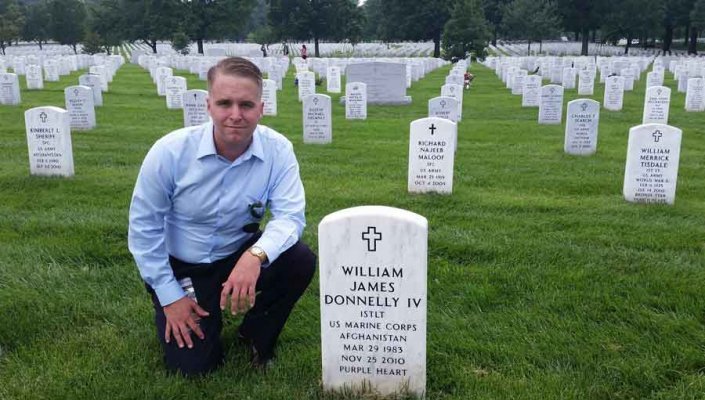Come Thanksgiving, I will think of his sacrifice and the human cost of war
Joel Searls visits 1st Lt. William Donnelly IV’s gravesite at Arlington National Cemetery. Photo courtesy of the author.
Family time eluded me for much of 2010. As my unit prepared to join the ever-growing number of U.S. troops in Afghanistan, the Marine Corps kept us busy training in North Carolina and Arizona.
When the Thanksgiving holiday rolled around, I was grateful to head home to Columbus, Ohio, to spend as much time as I could with loved ones before deploying to Helmand province. We gathered for a traditional feast and family time at a cousin’s house for what would truly be a time of thanksgiving. It had been a particularly deadly year for troops in Afghanistan, and although the future loomed unpredictably before us, we were glad for the chance to be together.
A few minutes after arriving, celebration turned suddenly to shock, then sorrow, when I received an email from an officer from my platoon at The Basic School. “Fallen TBS classmate,” read the subject line. I opened it up and read. First Lt. William Donnelly IV had died in Helmand province, Afghanistan, on Thanksgiving Day.
Donnelly and I had served in the same platoon at The Basic School at Camp Barrett in Quantico, Virginia, where newly commissioned Marine Corps officers learn the basics of serving as officers. He was one the first people I met when I arrived in the fall of 2008, and he immediately struck me as smart, straightforward, and funny, too. I got to know him even better over the coming months of long and intense training in the Quantico highlands. Donnelly, who began his military career as an enlisted Marine in the Reserve, had a way of making a joke or subtle comment during grueling field events that made us smile or chuckle when we needed it most.
During one field exercise, Donnelly was assigned the role of squad leader, and he chose me as his radio telephone operator and fighting hole-mate. He showed up with a shovel, digging through the thick, clay-like mud of the highlands, and I used a mini hatchet to create the shelter, inspired by old episodes of “MacGyver.” This was no run-of-the-mill fighting hole; by the time we finished, we’d created a small fortress in the woods with an in-depth trench, stairs and a cover fashioned from our combat tarp. The ingenuity of the mighty fighting hole must have impressed one of our evaluators, a Marine Corps captain who asked me if I was an Eagle Scout. (I wasn’t.)
As night crept in, Donnelly and I were relegated to our fighting hole. Our efforts paid off — the cover kept us somewhat protected from the freezing rain that fell for hours, turning the ground into a muddy mess. Thankfully, we’d built our sleeping quarters on a slope, keeping any water moving down and away from us. Come morning, we were nearly frozen in our sleeping bags. Glad to escape from the icy slumber, we disassembled our creation and headed back to the barracks, bonded by the adventure.
Donnelly would choose me as his platoon sergeant for our next event at the live fire range, and as always, he excelled there, too. He passed his evaluation with flying colors and soon earned the military occupational specialty of infantry officer, which he’d had his heart set on. At The Basic School graduation in the spring of 2009, we said our goodbyes. It had been a long seven months, and we’d grown as leaders and Marines. I felt grateful to get to know him. I was proud, too, knowing I had helped support his dream.
As we moved on in our careers, Donnelly and I mostly fell out of touch, but through social media and the grapevine I knew he’d been assigned to 3rd Battalion, 5th Marine Regiment, 1st Marine Division, I Marine Expeditionary Force, Camp Pendleton, California, and become a platoon commander. He’d bought a home, and two weeks before deploying to Afghanistan, he got married. It seemed like life was going very well for him.
First Lt. William Donnelly IV training in the desert. Photo courtesy of ltdonnelly.com.
Now, two years after we’d met, I tried to absorb the news that he was gone. The weight of losing a friend and fellow Marine for the first time forced me into a chair, and my family asked what was wrong. The news struck them, too, and they responded with empathy and shared sadness. Around the dinner table, we said a prayer for his family.
Later that night, I went to sleep at my grandmother’s house and dreamed about him. Our platoon from The Basic School had gathered inside a simple, red brick church for his funeral. The rear door opened and bright light shone through. Then in walked Donnelly, in his dress blues, just how I remembered him. We gathered around him, all wanting to talk. I asked him if he was all right. He looked at me and smiled. “Just fine,” he said, and as I went to hug him, I woke up. As I lay there in the dark silence, I wondered what it had all meant. Maybe he was saying goodbye.
The night before his funeral at the U.S. Navy Academy chapel, I stayed with friends, including Al, a Marine who’d performed funeral details at Arlington National Cemetery during Vietnam. Early on the morning of the service, I stood in my dress blues and Al looked me over. He’d required two sets of blues back then, Al told me— often, he’d perform half a dozen details in the morning and another six after lunch. That still sticks with me, how thousands of young men never got the chance to live out their futures.
As I drove to the chapel, I thought about Donnelly’s lost future and struggled to compose myself. You can hear stories about sacrifice, but for the first time, I truly understood it. I knew the human cost of war, and I knew it was up to all of us who make it home to carry on the memory of those who don’t. I took this with me as I departed for my own deployment two months after Donnelly was laid to rest at Arlington.
Donnelly is never far from my thoughts, and a dozen years after his death, I wonder what his life would be like today. One thing I know for certain is that come Thanksgiving, when I sit at the table with the people I love, I’ll think of my friend Will, and all those who gave their lives for their country. I’ll say a prayer for his family — for all the families with an empty place at their tables and in their hearts.
Editor’s note: This article first appeared on The War Horse, an award-winning nonprofit news organization educating the public on military service.


